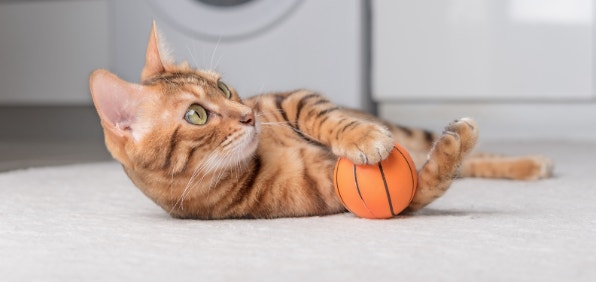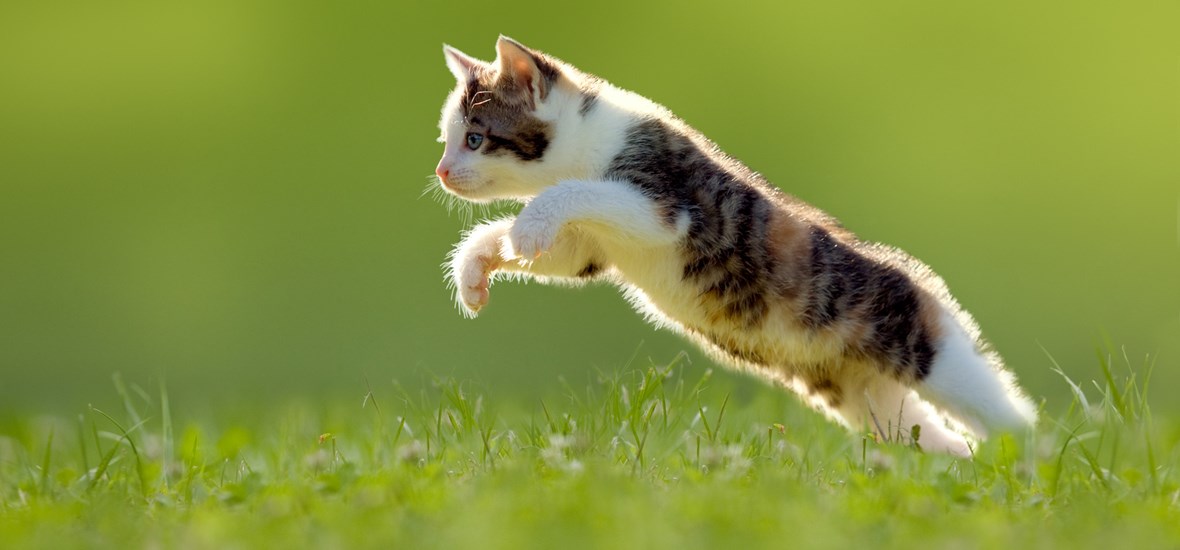
CAT & KITTEN GAMES: FUN WAYS TO PLAY WITH YOUR FURRY FRIEND
Like children, kittens love to play. Young cats spend most of their waking hours playing, whether it be jumping around, pouncing, hiding, stalking, climbing, or catching. The good news is that owners can get involved in kitten games and have just as much fun playing with cats.
Kitten playing is not just about having fun, however. Cat play allows kittens to hone their motor skills and instincts, integral for catching prey in the wild. Kitten games are mentally stimulating and help build up stamina and strength, as well as stay healthy. Games for kitties also relieve boredom, build a bond between you and your pet, and can help prevent certain destructive behaviours.
Today, we are guiding you through the different types of kitten games you can try when playing with cats. From hunting games to peek-a-boo playtime, we will go through a range of cat games, showing you how to play with cats to help them develop both physically and mentally.
Why are games and play so important for cats of all ages?
Cat play is not just something kittens enjoy. Cats of all ages play games, with many older cats acting like kittens at times.
Cats games allow them to fulfil their natural instincts, such as exploring, climbing, observing, and pouncing. When playing with cats, you are helping them stay fit and healthy, both mentally and physically. Playing indicates a cat is in good health and is well-stimulated. Cat play is all fun and games, but it also contributes to a cat’s complete well-being.
For kittens, playtime is crucial, as what happens during this early period of life can have lasting consequences. When you see a kitten playing, it is a naturally adopted behaviour, instinctual to all cats. Kitten games allow cats to discover and explore their environment and learn to trust other animals and human beings, creating a lasting bond.
Playing is essential for kittens development
According to Dr Corinne Lesaine, a consulting veterinarian here at Perfect Fit™, “Playing is key to your kitten's healthy development and especially to their mental development throughout the socialisation stages. It is therefore recommended that you take full advantage of, and encourage, your kitten's innate curiosity.”
“Such curiosity may easily be stimulated with fast and unpredictable movements of small objects and toys that will capture their full attention. Small soft objects are also ideal for intriguing your curious little friend. You may also consider stimulating them with the presence of other pets, thereby encouraging interaction through playfulness.”
There are many games for kitties that are enjoyable and stimulating. Some of these include playing hide and seek using a cardboard box, waving small, curious items in and out of her view, dangling soft objects for them to grasp, dropping a leaf to catch, and letting them pounce on small items pulled from under their nose.
When playing, protect your hands, as cats of all ages can leave nasty scratch marks. Also, let your kitten win games, as they can become frustrated when losing time and time again, leading to possible anger and aggressive behaviour.
Making playtime with your cat a mutually enjoyable experience
Playing with cats can be a hugely rewarding experience for both the owner and the cat. Fully-grown cats often have their own games they like to play, but owners can always play a new game with their pet for further stimulation.
Many pet owners wonder how to play with cats, but there are no set rules. As long as it’s safe for both you and your pet, you can play many types of cats games. For example, most cats love a simple cardboard box to hide in, push around, and scratch. Ping pong balls are also a hit with many cats, helping stimulate their hunting instincts and keep them physically active.
Climbing and hiding are important parts of kitten playing time. Therefore, you should have areas in your home suitable for cats to be active and stand atop to observe their surroundings from a height.
As time goes on, cats tend to become less playful and active, which is completely normal. Cats over eight may not participate in as much cat play, but you can still try and engage them in quality playtime.
How to Play with Cats Using Simple Kitten Games
Cats games come in all shapes and sizes, and there are a number of great kitten games that are free and fun.
One such game is ‘chase the string,’ where you drag a string, or toy, letting your kitten chase it. The string mimics prey, giving your kitten a chance to sharpen their primitive instincts, improve coordination, get exercise, and build a bond with you. This also encourages healthy play habits, redirecting their boundless energy away from scratching or biting.
Caution: Never leave a cat to play with a length of string or wool, they tend to roll around in playtime and may cause a risk of strangulation.
You can also use a laser pointer or torch to create a moving source of light (laser dot) for your kitten to chase. Again, this engages their hunting instincts and keeps them mentally stimulated. Just ensure you never shine the light directly in your cat’s eyes, as this can damage their eyesight. At the end of the game, allow your cat to catch something tangible, such as a soft toy, to avoid frustration.
When playing cat games, keep them short to prevent overstimulation. Supervise your kitten at all times, particularly when playing with string, as this can lead to ingestion and serious health issues.
Kitten Playing: Essentials for Stimulating Play
Mixing up ways to play with cats is vital for maintaining their interest and energy levels. It is best to use toys that can move in quick and unpredictable ways, mimicking the movement of birds and mice. Only introduce squeaky toys gradually, as some cats can become startled by the noise.
Even if a cat loves one toy, it will likely become bored with the same one over time. Therefore, it is recommended to swap toys around every few days to keep young cats interested and stimulated.
Interactive games, such as puzzle toys, climbing, fishing-rod-type toys, chasing balls, and chasing the string, are great for kitten development, training and teaching skills, and overall mental health. A few short daily supervised sessions are recommended, mimicking the normal daily activity levels of cats.
Caution: Never leave the cat to play alone with string, wool or fishing-rod-type toys as they tend to roll around on the string and pose a risk of strangulation
Game for Cats: Choosing the Right Toys
Selecting the right toy for your cat is essential for safety and enjoyment. The best toys suited to cats can depend on their individual habits and temperaments. Nevertheless, most cats seek ways to engage in their natural instincts of scratching, chasing, punching, and climbing. Finding toys and games for cats that suit their preferences can help them develop more quickly.
Examples of safe and engaging toys include toy mice (hunting toys), balls (preferably with a bell inside), laser pointers, climbing toys, food puzzle toys, catnip toys, scratching posts, and household items like cardboard boxes. Even a ball of rolled up paper can provide amusement.
There are many types of cat toys available, both high-tech and DIY. Learn your cat’s habits and preferences before purchasing a range of toys to save money. Moreover, ensure you rotate the use of your cat’s toys to keep their interests peaked.

Playing with Cats: Interactive and Bonding Games
When playing with cats, owners may be unaware that they are building an important bond with their pet. Playtime solidifies the human-animal bond, helping your cat build trust and affection towards you.
Regular cat games, such as puzzles and those that are treat-based, are particularly helpful in growing a bond. Remember that cats are natural stalkers and hunters, so using a toy on a wand is great for mimicking the actions of prey.
Cats love intelligent games like finding hidden food in a puzzle, as it mentally stimulates them and, of course, they enjoy a tasty treat at the end. When playing with a cat, you can feed them a treat to reinforce positive behaviour whilst forming a lasting trust.
You can also use a small toy to play fetch with your cat, giving them a chance to use their natural instincts to catch and retrieve prey and spend quality time with you. Hide and seek is another fun game for both feline and human, having positive effects on emotional well-being for both.
If your cat shows any signs of irritation or frustration during a game, such as behaviours like kneading, it may indicate they are not enjoying or have had enough. If so, move on to a new game or let your cat have time to itself.
Cats Games That Educate and Entertain
Cats games not only provide entertainment, but they also serve as effective foundations for teaching basic commands and boundaries. Incorporating obstacle courses and games like hide-and-seek with treats can be enjoyable and educational. For instance, hide-and-seek taps into a cat’s natural hunting and foraging instincts, providing physical and mental stimulation. It also encourages exploration, whilst treats can reinforce positive behaviour.
With gentle coaching, obstacle courses can be beneficial to a cat’s mental and physical health, providing them with exercise and helping them learn to navigate different environments. In turn, this reinforces commands and boundaries in a fun way.
How to play with your Cat: Day-to-Day Fun Activities
When playing cat games, a few short sessions a day is recommended. If you play too much, your cat may become overstimulated, tired, and start to act out unwanted behaviours.
You can use everyday household items when playing with cats, such as cardboard boxes and paper balls. Keep each session short to around 10 to 15 minutes for adult cats and 15 to 20 minutes for kittens. This allows them to expend their energy. As cats tend to be more active in shorter bursts, you can cut playtime into shorter sessions, but if they become uninterested or show signs of fatigue, you should let them rest.
It’s important to balance playtime with relaxation, especially for kittens. Observe your kitten for signs of overstimulation, such as a twitching tail, sudden aggression, or restlessness. If they show any signs of stress, allow them to rest in a quiet, comfortable space. There will always be time to relax together afterwards.
Games for Cats: High Tech Entertainment Solutions
Aside from DIY toys, there are modern high-tech entertainment solutions for cats to enjoy these days. Examples include interactive digital games, such as apps specifically designed for cats, on smartphones and tablets. These apps feature moving objects like fish or mice, allowing your cat to chase them on the screen.
Laser toys provide unpredictable movements that cats can chase without you having to manually move the laser. Interactive puzzle toy challenges are also available where your cat needs to find out ways to retrieve hidden treats inside compartments, providing mental stimulation. These automated games are suitable for cats when left unattended, ensuring prolonged entertainment and stimulation.
Find out more about playing with your cat here.
